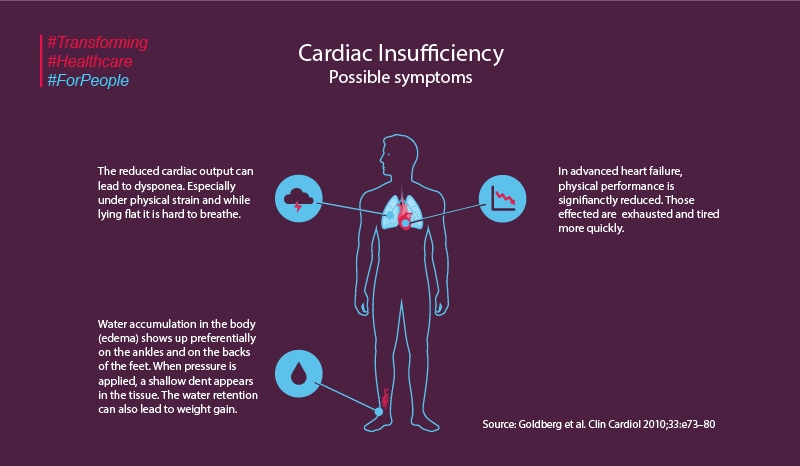New Compounds Give Patients Hope

- Health at Bayer
-
Pharmaceuticals
- Treatment Areas
- Innovation & Technologies
- Cell and Gene Therapy
-
Sustainability
- Patient Access Charter
- Leadership Perspective
- Strengthening Healthcare Access
- Moving Non-Communicable Diseases Care Forward
- Ensuring a Sustainable Product Supply
- Delivering Better Cancer Care
-
Empowering Women, Globally
- Boosting Family Planning Usage through Digital Channels
- Capacity building: Addressing Root Causes through Partnerships
- Impact at Scale: The Challenge Initiative
- Promoting Awareness: World Contraception Day (WCD) & the Your Life Campaign
- Providing Accessible and Affordable Contraceptives
- Enabling Family Planning in Humanitarian Settings
- Fighting Neglected Tropical Diseases
- Transparency
- News & Stories
- Personal Health
- Report a Side Effect
- Medical Counterfeits
The figures are alarming: One in five people will develop heart failure in the course of their lives. More than 40,000 deaths a year in Germany alone are caused by a weak heart. New therapies could offer hope in the future. They are designed to strengthen the body's most important muscle and could thus potentially improve the quality of life of those affected and reduce hospital admissions and deaths.
The heart has been painted by artists, described by poets and extolled by bards, and yet it is merely a 300-gram collection of blood vessels and muscle tissue. Through a network of arteries, veins and tiny capillaries, this hollow body pumps up to 10,000 liters of blood through the circulatory system every day, keeping the human system running. A perfect construction, but one that is prone to failure. According to estimates by the German Heart Foundation, around 2.5 million people in Germany suffer from cardiac insufficiency, or chronic heart failure. Their heart muscle is no longer able to transport enough oxygen and nutrients to organs, tissues and cells.
Heart failure is a gradual process
Other than the occasional cold, Peter Christensen* has never been seriously ill. As a self-employed civil engineer, he often sat at his desk until late in the evening and was used to exertion. As tennis player, he often pushed himself to the limit. "But after my 65th birthday, I gradually lost my strength," he recalls. First, he struggled for breath on the tennis court, and then climbing the stairs to his office in Düsseldorf's historic district left him gasping for air. "I blamed it on age and all the stress," says the now 72-year-old. But his cardiologist diagnosed advanced heart failure, caused by the high blood pressure Christensen had ignored for years.
Heart failure often creeps slowly into the lives of those affected. "It develops over months or even years," explains Professor Burkert Pieske, Director of Clinics for Internal Medicine and Cardiology at Charité Berlin and the German Heart Institute Berlin. "Those affected are short of breath, their performance decreases, or they suffer from water retention – edema," says the cardiologist, summing up the most common symptoms. According to the German Heart Report, chronic heart failure is one of the most common causes of death in Germany, affecting 40,300 people, and is the main reason for hospitalization, accounting for more than 460,000 cases per year. This is because many sufferers fail to recognize the symptoms and wait too long before seeking medical help. However, the earlier therapy begins, the longer the life expectancy.

Alarming increase in the number of affected people
Strictly speaking, cardiac insufficiency is not a disease in its own right, but usually the result of an underlying condition. According to the German Heart Foundation, in about two-thirds of cases it is caused by constricted coronary arteries or occurs after a heart attack; in other patients it is caused by inflammation of the heart muscle, defective heart valves or genetic factors. Alcohol and drug consumption, medications, rheumatic disorders or diabetes also affect the heart and can lead to insufficiency. In fact, the list of possible causes is long. In our aging society, a weak heart is a growing problem. According to a study by the George Institute for Global Heath in Oxford, up to five percent of 65- to 75-year-olds and almost ten percent of those over 80 already suffer from it. Within two years, the number of people affected has risen by 3.7 percent, according to the German Heart Foundation. A reversal of the trend is not in sight. Medical progress is also helping many heart patients to live longer, even if their most important organ is already severely weakened.
"We now have a whole range of drugs that improve the quality of life of those affected and reduce hospital admissions and the number of deaths," says Pieske. For example, diuretics are used to help to excrete more water through the kidneys and thus prevent edema. Other groups of drugs, such as renin-angiotensin blockers or beta-blockers, can protect the heart by suppressing the activity of harmful hormones and the sympathetic nervous system.
*Name changed by the editor



Prof. Burkert Pieske









